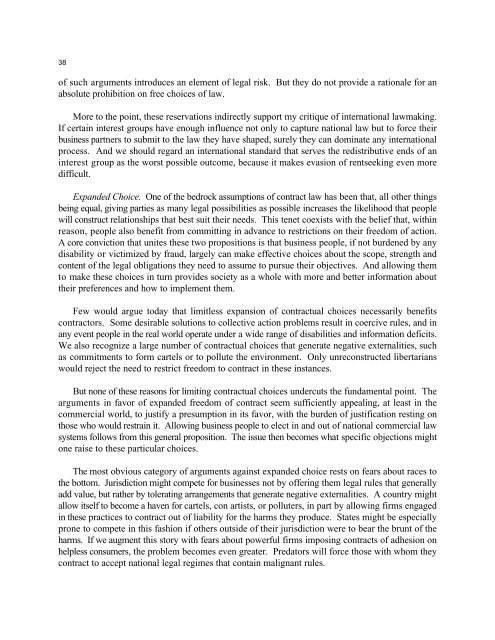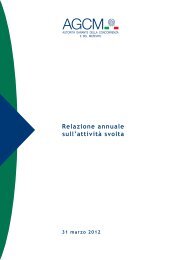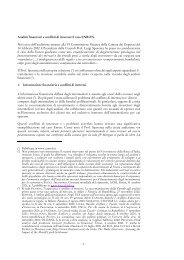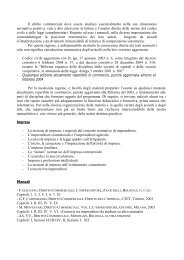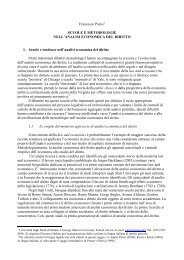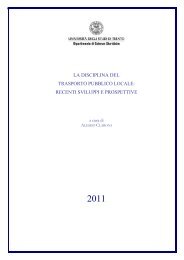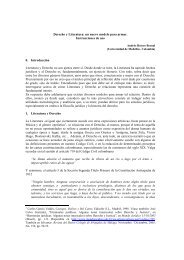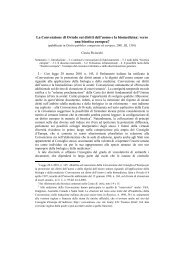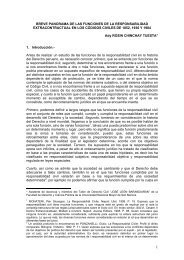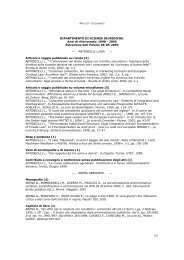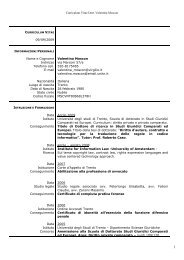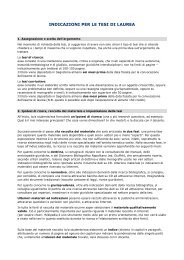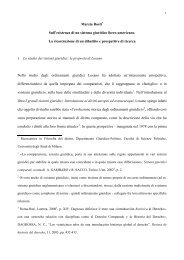The Futility of Unification and Harmonization in International ...
The Futility of Unification and Harmonization in International ...
The Futility of Unification and Harmonization in International ...
You also want an ePaper? Increase the reach of your titles
YUMPU automatically turns print PDFs into web optimized ePapers that Google loves.
38<strong>of</strong> such arguments <strong>in</strong>troduces an element <strong>of</strong> legal risk. But they do not provide a rationale for anabsolute prohibition on free choices <strong>of</strong> law.More to the po<strong>in</strong>t, these reservations <strong>in</strong>directly support my critique <strong>of</strong> <strong>in</strong>ternational lawmak<strong>in</strong>g.If certa<strong>in</strong> <strong>in</strong>terest groups have enough <strong>in</strong>fluence not only to capture national law but to force theirbus<strong>in</strong>ess partners to submit to the law they have shaped, surely they can dom<strong>in</strong>ate any <strong>in</strong>ternationalprocess. And we should regard an <strong>in</strong>ternational st<strong>and</strong>ard that serves the redistributive ends <strong>of</strong> an<strong>in</strong>terest group as the worst possible outcome, because it makes evasion <strong>of</strong> rentseek<strong>in</strong>g even moredifficult.Exp<strong>and</strong>ed Choice. One <strong>of</strong> the bedrock assumptions <strong>of</strong> contract law has been that, all other th<strong>in</strong>gsbe<strong>in</strong>g equal, giv<strong>in</strong>g parties as many legal possibilities as possible <strong>in</strong>creases the likelihood that peoplewill construct relationships that best suit their needs. This tenet coexists with the belief that, with<strong>in</strong>reason, people also benefit from committ<strong>in</strong>g <strong>in</strong> advance to restrictions on their freedom <strong>of</strong> action.A core conviction that unites these two propositions is that bus<strong>in</strong>ess people, if not burdened by anydisability or victimized by fraud, largely can make effective choices about the scope, strength <strong>and</strong>content <strong>of</strong> the legal obligations they need to assume to pursue their objectives. And allow<strong>in</strong>g themto make these choices <strong>in</strong> turn provides society as a whole with more <strong>and</strong> better <strong>in</strong>formation abouttheir preferences <strong>and</strong> how to implement them.Few would argue today that limitless expansion <strong>of</strong> contractual choices necessarily benefitscontractors. Some desirable solutions to collective action problems result <strong>in</strong> coercive rules, <strong>and</strong> <strong>in</strong>any event people <strong>in</strong> the real world operate under a wide range <strong>of</strong> disabilities <strong>and</strong> <strong>in</strong>formation deficits.We also recognize a large number <strong>of</strong> contractual choices that generate negative externalities, suchas commitments to form cartels or to pollute the environment. Only unreconstructed libertarianswould reject the need to restrict freedom to contract <strong>in</strong> these <strong>in</strong>stances.But none <strong>of</strong> these reasons for limit<strong>in</strong>g contractual choices undercuts the fundamental po<strong>in</strong>t. <strong>The</strong>arguments <strong>in</strong> favor <strong>of</strong> exp<strong>and</strong>ed freedom <strong>of</strong> contract seem sufficiently appeal<strong>in</strong>g, at least <strong>in</strong> thecommercial world, to justify a presumption <strong>in</strong> its favor, with the burden <strong>of</strong> justification rest<strong>in</strong>g onthose who would restra<strong>in</strong> it. Allow<strong>in</strong>g bus<strong>in</strong>ess people to elect <strong>in</strong> <strong>and</strong> out <strong>of</strong> national commercial lawsystems follows from this general proposition. <strong>The</strong> issue then becomes what specific objections mightone raise to these particular choices.<strong>The</strong> most obvious category <strong>of</strong> arguments aga<strong>in</strong>st exp<strong>and</strong>ed choice rests on fears about races tothe bottom. Jurisdiction might compete for bus<strong>in</strong>esses not by <strong>of</strong>fer<strong>in</strong>g them legal rules that generallyadd value, but rather by tolerat<strong>in</strong>g arrangements that generate negative externalities. A country mightallow itself to become a haven for cartels, con artists, or polluters, <strong>in</strong> part by allow<strong>in</strong>g firms engaged<strong>in</strong> these practices to contract out <strong>of</strong> liability for the harms they produce. States might be especiallyprone to compete <strong>in</strong> this fashion if others outside <strong>of</strong> their jurisdiction were to bear the brunt <strong>of</strong> theharms. If we augment this story with fears about powerful firms impos<strong>in</strong>g contracts <strong>of</strong> adhesion onhelpless consumers, the problem becomes even greater. Predators will force those with whom theycontract to accept national legal regimes that conta<strong>in</strong> malignant rules.


